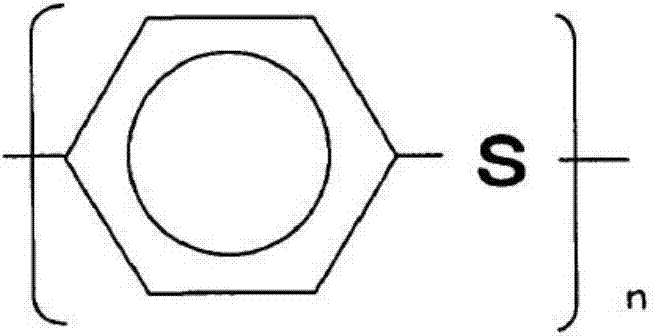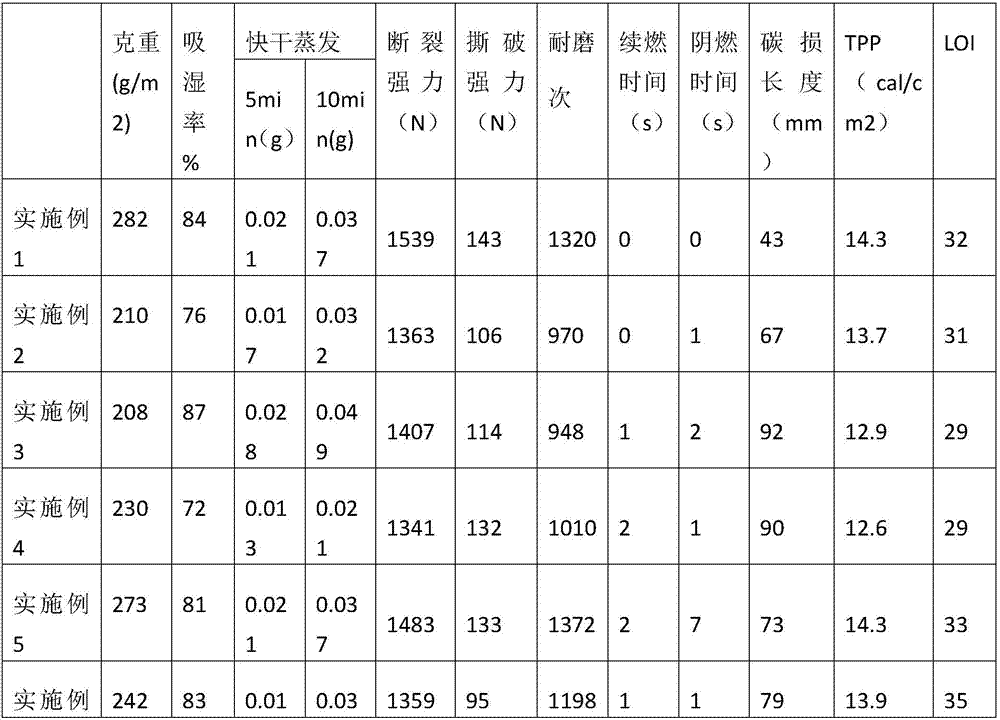Fabrics made from flame retardant yarns comprising polymer blend fibers of aramid and polyarylsulfone and methods of making the same
A technology of aromatic polyamides and blended polymers, applied in the field of flame-retardant yarns, can solve problems such as obvious droplet phenomenon, difficult dyeing, secondary damage, etc.
- Summary
- Abstract
- Description
- Claims
- Application Information
AI Technical Summary
Problems solved by technology
Method used
Image
Examples
Embodiment 1
[0158] The fiber weight ratio is: 30% blended polymer fibers of aromatic polyamide and polyarylsulfone, 20% flame-retardant nylon, 35% flame-retardant viscose, 15% aramid 1414, and the four fibers pass through conventional cotton spinning system equipment The prepared clear cotton blended sliver is then spun into 24s spun yarn by a ring spinning frame, and doubled by a ply machine to make a flame-retardant 24s / 2 ply yarn as a weaving warp yarn. Take the same similar process and blending ratio to make 20s / 2 as weaving weft yarn. The natural color twill fabric with a grammage of 267g / m2 is woven by an air jet machine. The washed fabric is jet dyed in an overflow dye vat. Gained colored finished fabric grammage is 282g / m .
Embodiment 2
[0160] The fiber weight ratio is: 25% blended polymer fibers of aromatic polyamide and polyarylsulfone, 30% flame-retardant nylon, 35% flame-retardant viscose, 10% aramid 1414, and the four fibers pass through conventional cotton spinning system equipment The prepared clear cotton blended sliver is then spun into 30s spun yarn by a compact spinning frame, and then doubled by a ply machine to make a flame-resistant 30s / 2 ply yarn as a weaving warp yarn. Take the same similar process and blending ratio to make 28s / 2 as weaving weft yarn. Weave into the natural color twill fabric of grammage 203g / m2 by shuttle loom. The washed fabric is jet dyed in an overflow dye vat. Gained colored finished fabric grammage is 210g / m2.
Embodiment 3
[0162] The fiber weight ratio is: 20% blended polymer fibers of aromatic polyamide and polyarylsulfone, 35% flame-retardant nylon, 40% flame-retardant viscose, 5% aramid 1414, and the four fibers pass through conventional cotton spinning system equipment The prepared clear cotton blended sliver is then spun into 32s spun yarn by a compact spinning frame, and then doubled by a ply machine to make a flame-retardant 32s / 2 ply yarn as a weaving warp yarn. Weave into the natural color plain weave fabric of grammage 201g / m2 by shuttle loom. The washed fabric is jet dyed in an overflow dye vat. Gained colored finished fabric grammage is 208g / m2.
PUM
| Property | Measurement | Unit |
|---|---|---|
| glass transition temperature | aaaaa | aaaaa |
| glass transition temperature | aaaaa | aaaaa |
| glass transition temperature | aaaaa | aaaaa |
Abstract
Description
Claims
Application Information
 Login to View More
Login to View More - R&D
- Intellectual Property
- Life Sciences
- Materials
- Tech Scout
- Unparalleled Data Quality
- Higher Quality Content
- 60% Fewer Hallucinations
Browse by: Latest US Patents, China's latest patents, Technical Efficacy Thesaurus, Application Domain, Technology Topic, Popular Technical Reports.
© 2025 PatSnap. All rights reserved.Legal|Privacy policy|Modern Slavery Act Transparency Statement|Sitemap|About US| Contact US: help@patsnap.com



